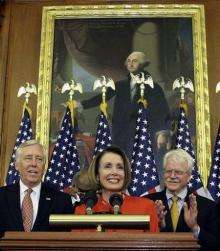Landmark health bill passes House on close vote

(AP) -- The Democratic-controlled House narrowly passed far-reaching health care legislation, handing President Barack Obama a hard-won victory on his chief domestic priority though the road ahead in the Senate promises to be rocky.
The 220-215 vote late Saturday cleared the way for the Senate to begin a long-delayed debate on the issue that has come to overshadow all others in Congress.
"The House bill is dead on arrival in the Senate," Sen. Lindsey Graham, R-S.C., said Sunday. "It was a bill written by liberals for liberals." A Democratic colleague, Sen. Jack Reed of Rhode Island, predicted an overhaul would pass the Senate because "it's essential" to the country's economic success and people's quality of life. "It will take time," he added.
House Republicans were nearly unanimous in opposing the plan that would expand coverage to tens of millions of Americans and place tough new restrictions on the insurance industry.
A triumphant Speaker Nancy Pelosi compared the legislation to the passage of Social Security in 1935 and Medicare 30 years later.
Obama, who went to Capitol Hill on Saturday to lobby wavering Democrats, said in a statement after the vote that he looked forward to signing a bill by year's end.
Republicans detailed their objections across hours of debate on the 1,990-page, $1.2 trillion legislation.
"We are going to have a complete government takeover of our health care system faster than you can say, `this is making me sick,'" said Rep. Candice Miller, R-Mich.
In the run-up to a final vote, conservatives from the two political parties joined forces to impose tough new restrictions on abortion coverage in insurance policies to be sold to many individuals and small groups.
The legislation would require most Americans to carry insurance and provide federal subsidies to those who otherwise could not afford it. Large companies would have to offer coverage to their employees. Both consumers and companies would be slapped with penalties if they defied the government's mandates.
Insurance industry practices such as denying coverage because of medical conditions would be banned, and insurers would no longer be able to charge higher premiums on the basis of gender or medical history. The industry would also lose its exemption from federal antitrust restrictions on price fixing and market allocation.
At its core, the measure would create a federally regulated marketplace where consumers could shop for coverage. In the bill's most controversial provision, the government would sell insurance, although the Congressional Budget Office forecasts that premiums for it would be more expensive than for policies sold by private companies.
Graham said he thinks the government option "will destroy private health care. Nobody in this country in the insurance business can compete with a government-sponsored plan, where the government writes the benefits and politicians will never raise the premiums."
Sen. Joe Lieberman, an independent from Connecticut, said that "if the public option plan is in there, as a matter of conscience, I will not allow this bill to come to a final vote because I believe the debt can break America and send us into a recession that's worse than the one we're fighting our way out of today."
The House bill drew the votes of 219 Democrats and Rep. Joseph Cao, a first-term Republican who holds an overwhelmingly Democratic seat in New Orleans. Opposed were 176 Republicans and 39 Democrats.
From the Senate, Majority Leader Harry Reid of Nevada issued a statement saying, "We realize the strong will for reform that exists, and we are energized that we stand closer than ever to reforming our broken health insurance system."
To pay for the expansion of coverage, the bill cuts Medicare's projected spending by more than $400 billion over a decade. It also imposes a tax surcharge of 5.4 percent on income over $500,000 in the case of individuals and $1 million for families.
Graham and Reed were on CBS' "Face the Nation." Lieberman appeared on "Fox News Sunday."
©2009 The Associated Press. All rights reserved. This material may not be published, broadcast, rewritten or redistributed.




















